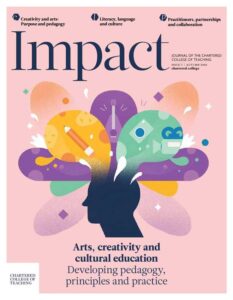The aim of this project was to see how drama could be used to contextualise understanding across a range of subjects. Dorothy Heathcote MBE created ‘Mantle of the Expert’ (2008) to develop teaching and learning through dramatic-inquiry-based approaches. This approach has been used successfully at primary level for many years, but I wanted to see whether it could be applied across a variety of subjects in an 11–16 setting. A secondary aim was to remove the barriers about using ‘the arts’ to teach across the curriculum. Adults often respond negatively to the notion of role play; this raised the question: If they would not participate themselves, could they actually be encouraged to apply it in their teaching?
The experts
I wanted there to be a clear focus on developing understanding of careers associated with the subjects that students learn; therefore, staff were asked to adapt their lessons and give students an industry-recognised job role. As ‘the experts’, students
Join us or sign in now to view the rest of this page
You're viewing this site as a guest, which only allows you to view a limited amount of content.
To view this page and get access to all our resources, join the Chartered College of Teaching (it's free for trainee teachers and half price for ECTs) or log in if you're already a member.











